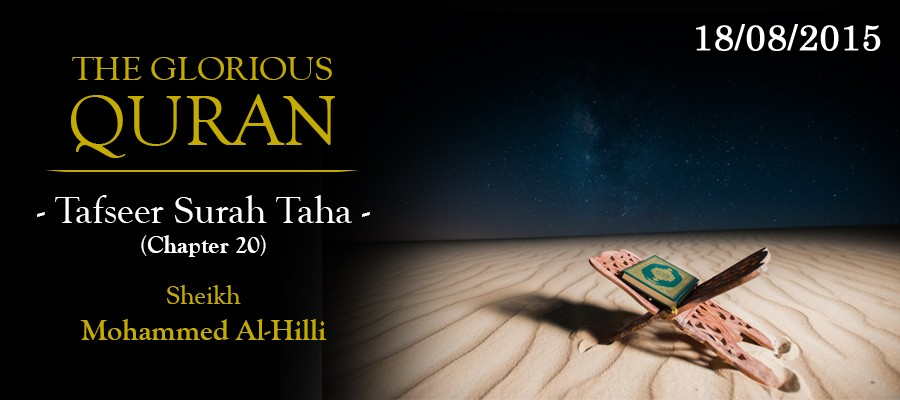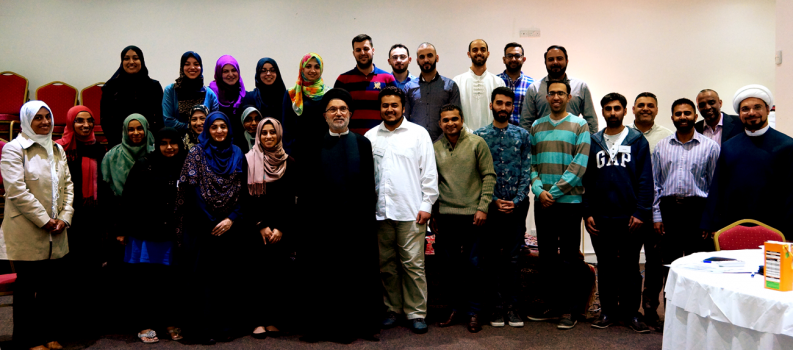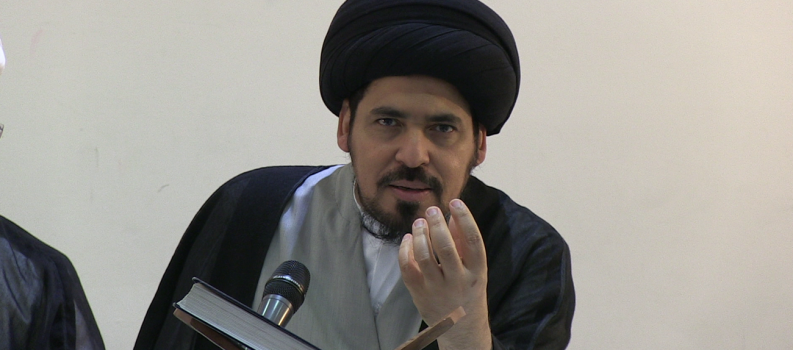
Shaykh Mohammed began this week by considering how the biography of Prophet Muhammed (s) is characterised by a number of battles. The Qur’an chronicles these battles as confrontations between the Muslims and the disbelievers. If we look at the first verse of Sūrat al-Fatḥ we see that Allah says: “‘innā fataḥnā laka fatḥan mubīnā – We have given you a clear victory” (48:1). However, this verse was not revealed in relation to any battle fought and won by the Muslims, but is referring to the Treaty of Ḥudaybiyyah. In fact, if we look throughout the Qur’an we do not see this kind of language concerning any military victory for the Muslims, such as the battles of Badr or Ḥunayn. What this highlights is that it’s not necessarily through physical battle that victory is achieved – rather it is achieved through peace. We know that in the diplomatic messages Prophet Muhammed sent to people, he’d often end the message with the phrase: “wal-salāmu `alā man ittaba`a al-hudā – peace be upon the one who follows guidance”, which is taken from the words of Moses and Aaron at the end of verse 47 of Sūrat Ṭā Hā, and it is here that he continue with our tafsīr.
We see with this phrase that peace and guidance are inherently connected. There is also no doubt about the importance placed on the notion of peace in Islam and throughout the Qur’an. For example, one of God’s names is “al-salām – the Peace”, Paradise is referred to as “dār al-salām – the house of peace” and of course, the standard greeting used by Muslims invokes peace: “al-salāmu `alaykum – peace be upon you”. In Sūrat al-Naḥl God tells us: “man `amila ṣāliḥan min δakarin ‘aw ‘unθā wahuwa mu’minun falanuḥyiyannahu ḥayātan ṭayyibah – whoever acts righteously, whether male or female, and believes, We will make them live a good life” (16:97). The concept of “ḥayātun ṭayyibah – a good life”, which we can also interpret as “a peaceful life”, needs a little investigation here. It does not refer to mundane, everyday actions, but instead refers to the spiritual life and the emotional wellbeing of an individual. Imam Ali (a) has said that ḥayātun ṭayyibah is characterised by contentedness. As such a peaceful life does not come from attaining material possessions or amassing wealth – it comes from having a heart that can be content with what one has, and it is this contentedness that God bestows upon his righteously acting believers. We can look at another similar verse in Sūrat al-Nisā’: “waman ya`mal min al-ṣāliḥāti min δakarin ‘aw ‘unθā wahuwa mu’minun fa’ulā’ika yadxalūna al-jannata walā yaẓlamūna naqīrā – and whoever does righteous deeds, whether male or female, and is a believer, so they will enter Paradise and will not be wronged as much as a naqīr.” (4:124). A naqīr, we are told, is the spec on the apex of a date-seed, i.e. a negligibly small amount. We may wonder why there is this emphasis on male and female in these verses. The reason for it is to show that there is no gender favouritism in Islam. Shaykh Mohammed recounted an anecdote in which a sister asked him why it was more difficult for women to ender Paradise. This is, of course, completely wrong. As these verses have shown, in the eyes of God all human beings are equal, regardless of their gender, and are judged solely by their actions. Coming back to the notion of peace, we see in Sūrat Yūnus that “allahu yad`ū ‘ilā dār al-salām wayahdī man yašā’ – God invites to the house of peace and guides whomever he wants” (10:25). Here we see, just as in the 47th verse of Sūrat Ṭā Hā, that peace and guidance are indelibly linked. So let us think a little about guidance itself.
Again in Sūrat Yūnus we are told to: “qul hal min šurakā’ikum man yahdī ‘ila al-ḥaqqi qul allahu yahdī lil-ḥaqqi ‘afaman yahdī ‘ila al-ḥaqqi aḥaqqu ‘an yuttaba`a ‘amman lā yahdī ‘illā ‘an yuhdā – say: “Is there anyone of your partners who guides to the truth?” Say: “God guides to the truth, so is He who guides to the truth worthier of being followed or he who doesn’t guide unless he is guided?” (10:35). This verse establishes God as the source of all guidance, because how can someone be a source of guidance if he himself needs to be guided? The only real source of guidance can be truth itself, which needs no guidance, and that is God. We should pause to note that guidance comes in all forms – it’s not just specifically religious guidance we are talking about. For example, the innate instinct of a child to drink from its mother’s milk is a form of guidance from God. God guides us through all aspects of our lives, and it is through this that we acquire peace.
So, returning to Moses and Aaron, they have confronted Pharaoh and told him four things. First, that they are messengers of God; second, to send the Israelites with them and not to punish them; third, that they have come with signs of God; and fourth, that peace is upon whoever follows guidance. Then, they have a fifth and final things to say: “‘innā qad ‘ūḥiya ‘ilaynā ‘anna al-`aδāba `alā man kaδδaba watawallā – it has been revealed to us that punishment will be upon whoever disbelieves and turns away” (20:48). We have to stop now and ponder these words a little. We know that the ethos of the Qur’an is one that encourages peaceful proselytising – we looked only last week at how Moses and Aaron were commanded to approach Pharaoh with peaceful speech, and the significance of this more widely. So why now are they threatening punishment? To understand this we have to take into consideration the fact that as human beings we need to know the repercussions of our actions in order to put them in a moral context and find motivation to avoid them. In any society there are laws, and breaking the law leads to punishment, otherwise the substance of the law has no meaning and we end up with an anarchic society. We also see that in different societies where they have a difference in the severity of the punishment for the same crime, the perception of the seriousness of the crime is different. It is fundamental to the mentality of the human being that, in order to know not to transgress, we need to know that there will be repercussions for our transgression. But even when Moses and Aaron talk about punishment their speech is still polite. First they say: “ūḥiya ‘ilaynā – it has been revealed to us”, demonstrating that they are not pursuing a personal vendetta against Pharaoh but mediating God’s message, and these are God’s words, not theirs. Then they say: “al-`aδāba `alā man kaδδaba watawallā – punishment will be upon whoever disbelieves and turns away.” We should point out that this phrase directly correlates with the earlier one: “al-salāmu `alā man ittaba`a al-hudā – peace is upon whoever follows guidance.” So, whoever follows guidance will attain peace and whoever turns away will receive punishment. In both these cases Moses and Aaron are using impersonal language, showing that they’re not singling out Pharaoh. Rather they are informing him of a truth, which is representative of a general reality.
People sometimes ask why the Qur’an has many vivid descriptions of Hell as an eternal abode for the wrongdoers. Isn’t this needlessly harsh? To answer this question we can ask: if a doctor tells you that if you have a poor diet and take no exercise you’ll have a heart attack, is the doctor being harsh? No, because all he’s doing is conveying a reality which is brought about by one’s own actions. Similarly, the Qur’an is simply conveying reality to us. If we look at Sūrat al-Nisā’ we see that God tells us: “‘inna allaδīna ya’kulūna ‘amwāla al-yatāmā ẓulman ‘innamā ya’kulūna fī buṭūnihim nārā – those who usurp the wealth of orphans, they are consuming fire in their stomachs’ (4:10). In Sūrat Āli `Imrān we are told of the Judgement Day: “yawma tajidu kullu nafsin mā `amilat min xayrin maḥḍūrā wamā `amilat min sū’ – that day every soul will find all the good it has done present, and all the evil it has done” (3:30). We are also told in hadiths that on Judgement Day a believer will be lead to Paradise by a very beautiful creation, and when they ask what that creation is, they will be told that it is the manifestation of the happiness they inspired in others. Similarly, in the narration of the mi`rāj we are told that in Paradise Prophet Muhammed saw angels building palaces, but they stopped before they had finished. When he asked them why they said that they were waiting for more material to continue building. When he asked what the material was they said that it was the praise of God by believers. Of course, when Prophet Muhammed later tells his companions about this they are all overjoyed that they will have such palaces in Paradise, but he also tells them that the palaces can be destroyed by sins. Taking all this into consideration, we can see how Paradise and Hell are not just objective places of reward and torment, but are dynamically created by our actions. It’s not that punishment and reward are simply waiting for us on Judgement Day, but that we construct our own punishment and reward by the deeds we perform in this life.
So, coming back to Moses’s and Aaron’s words, we see that they are not threatening Pharaoh, but informing him that punishment is a natural consequence of disbelief and turning away.
We should pause here to note that the Qur’anic narrative is very dynamic. Up until this point we have been witnessing the conversation between God and Moses in the valley of Ṭuwā, and the words that Moses and Aaron used with Pharaoh are mediated to us by God telling them what they should say. However, the next verse contains Pharaoh’s response. This particular narrative in Sūrat Ṭā Hā skips Moses’s journey from Midian back to Egypt, his rendezvous with Aaron, their journey into the palace and the repetition of their words to Pharaoh. These details are, however, revealed in hadiths and other parts of the Qur’an. It is narrated that Moses meets Aaron outside of the city and together they approach Pharaoh’s palace. There they are confronted by a couple of guards who ask them who they are, and they respond by saying they are messengers of God. The guards see Moses as a shepherd and Aaron as an Israelite slave and ask: “Could God not have sent better messengers?” This is reminiscent of the story of Saul as narrated in Sūrat al-Baqarah. After the time of Moses, when the Israelites were being oppressed and harassed by Goliath, the Israelites asked God to send them a leader who would help them resist and defend themselves. God sent Saul to be their king, but they said: “‘annā yakūnu lahu al-mulku `alaynā wanaḥnu ‘aḥaqqu bil-mulki minhu walam yu’ta sa`atan min al-māl – how can he have kingship over us when we are more worthy of kingship and he has not been given any amount of wealth?” (2:247). The criteria by which they judged him was worldly, disregarding him for his lack of wealth and not heeding to the fact that he had been sent by God. But God doesn’t choose His servants based on such mundane criteria, and when God chooses someone there can be no doubt of their suitability, regardless of whether human beings choose to see it or not. Imam Muhammed al-Jawad (a), for example, became an Imam at the age of eight, and after Prophet Muhammed’s (s) death and the question of Caliphate arose, Imam Ali (a) was overlooked because there were others older than him.
So, Moses and Aaron enter the palace and confront Pharaoh. We should remember that ten years have passed since Moses exiled himself to Midian, and in all those years Pharaoh had not seen or heard of him. Now he sees his surrogate son return, accompanied by a slave and demanding the emancipation of the Israelites. He is both shocked and disappointed. In Sūrat al-Šu`arā’ we see his immediate reaction: “‘alam nurabbika fīnā walīdan walabiθta fīna min `umurika sinīn | wafa`alta fa`lataka allati fa`alta wa’anta min al-kāfirīn – did we not raise you amongst us and you remained with us for years of your life? And then you did that deed that you did and now you are of the disbelievers” (26:18-19). The deed he is referring to here is Moses’s killing of an Egyptian narrated earlier in Sūrat Ṭā Hā and which we have already discussed at length. Now Pharaoh sees that the child whom he raised in his own household is the very Israelite who was prophesised to destroy him. Pharaoh’s shock and disappointment aside, his immediate priority is to try and deal with what he has been confronted with. So, when Moses and Aaron say that they are messengers of his Lord and that they have come to take the Israelites out of bondage, Pharaoh doesn’t address the issue at hand (his transgression and the slavery of the Israelites), but asks instead: “faman rabbukumā yā mūsā – so who is your Lord, oh Moses?” (20:49). This an attempt by Pharoah to derail the conversation and distract from its main objective. Furthermore, we should note that when Moses and Aaron first spoke to Pharaoh they said: “‘innā rasūlā rabbik – we are messengers of your Lord” (20:47), referring to God as Pharaoh’s Lord, but now Pharaoh doesn’t ask “who is my Lord?”, but “man rabbukumā – who is your Lord?”. Though Moses and Aaron have emphasised the fact that God is the Lord of everyone and everything, and of Pharaoh himself, Pharaoh refuses to acknowledge that there is a Lord above him. As far as he is concerned Moses and Aaron might have a Lord, but he does not. Even later on, when Pharaoh was drowning in the sea, and with his last breath he submitted, he could not bring himself to refer to God directly, saying instead: “‘āmantu ‘annahu lā ‘ilāha ‘illa allaδī ‘āmanat bihi banū ‘isrā’īl wa’anā min al-muslimīn – I believe that there is no god other than that one whom the Israelites believe in, and I am from those who submit [to him]” (10:90). Of course, when the Angel of Death stands before your eyes it’s too late to atone for your sins and Pharaoh’s submission was rejected. This kind of arrogance is typical of the wrongdoers as portrayed in the Qur’an. For example, in Sūrat al-Zuxruf we are told of the wrongdoers being punished in Hell, and how they will call out to Malik, the Angel of Hell, saying “liyaqḍi `alaynā rabbuk – let your Lord annihilate us: (43:77). Just like Pharaoh, even in the face of divine retribution they do not have the grace to say “our Lord”.
Finally, we can think about what significance Pharaoh’s use of “rabbukumā – your Lord” has in ascertaining his own beliefs. Some exegetes have suggested that Pharaoh believed in God but was too arrogant to admit it. Others have said no, Pharaoh’s beliefs were similar to those of the pre-Islamic Arab polytheists, that there was one absolute God, but that He is disconnected from the world and from humanity and has appointed other, lesser gods to take active roles in engaging with mankind, and that it’s these lesser gods that should be worshiped. Still others say that Pharaoh believed that he himself was the Lord and that by asking Moses and Aaron who their Lord is he is trying to see how their divine authority matched up to his own. In all these cases, however, we see that Pharaoh is unwilling to recognise a Lord above himself.
Insha’allah next week we will continue with our tafsīr, looking at the rest of the conversation with Pharaoh.








